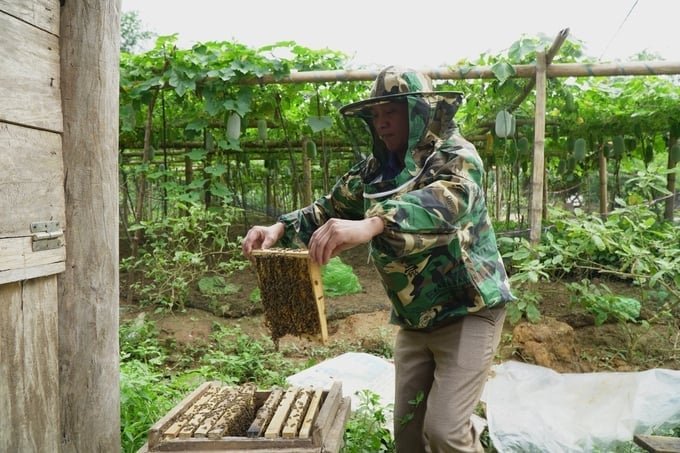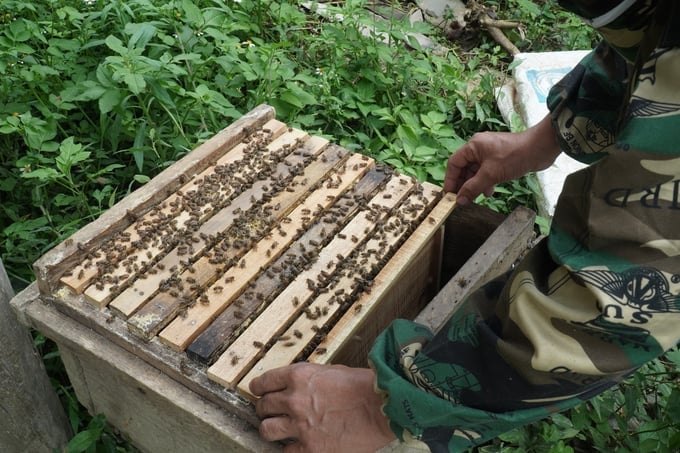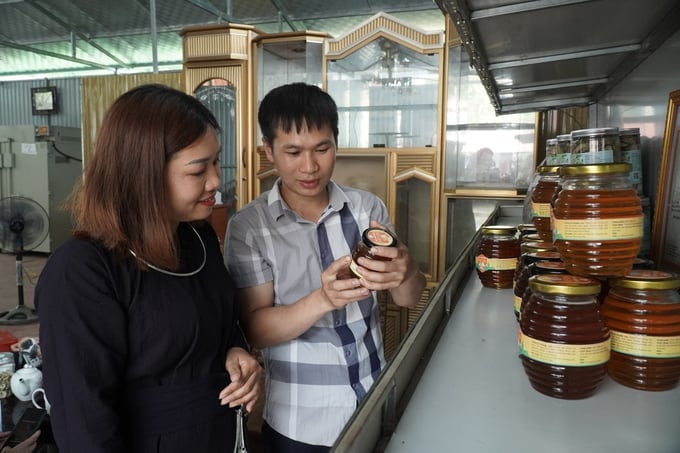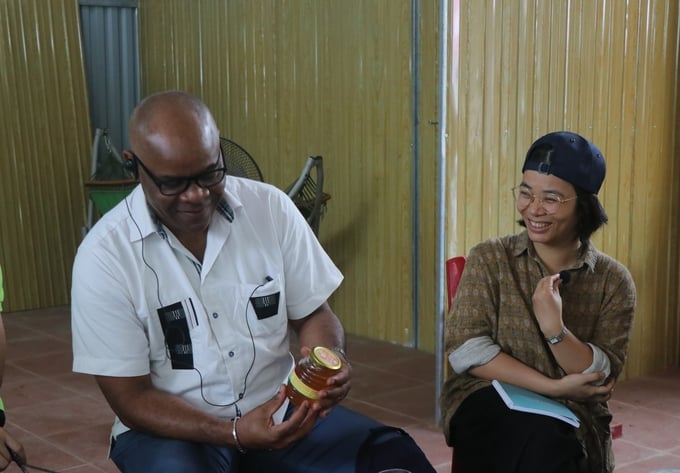June 1, 2025 | 02:08 GMT +7
June 1, 2025 | 02:08 GMT +7
Hotline: 0913.378.918
June 1, 2025 | 02:08 GMT +7
Hotline: 0913.378.918

Beekeeping for honey production has provided Dung's family with stable income. Photo: Ngoc Tu.
Na Duc hamlet, situated within Dia Linh commune, Ba Be district, Bac Kan province is enveloped by sprawling fields and vast hillsides. Local farmers utilized the fields to cultivate zucchinis, and the hillsides for plum and apricot blossoms.
Utilizing these natural advantages, Hoang Van Dung began the practice of beekeeping for honey in 1999. Starting with just one or two hives, Mr. Dung's bee colonies rapidly expanded, aided by the perennial availability of nectar sources.
During the early stages, Dung's honey was only sold within the commune; however, its quality quickly gained popularity, reaching customers in surrounding regions and neighboring provinces. However, the lack of systematic investment restricted the establishment of a distinct brand for Dung's honey.
Dung noted that he started focusing on beekeeping as a profession after he joined cooperatives and received training, support in hive management, packaging, and labeling. His family is currently managing approximately 30 beehives, with this number increasing during the spring when flowers bloom across the region. Favorable weather conditions, coupled with the natural abundance of floral species in mountainous terrain, result in a honey product characterized by its vibrant golden hue, aromatic fragrance, and soft sweetness.
"In 2023, our family harvested over 100 liters of honey. With the price of 300,000 VND per liter, we earned a total profit of over 30 million VND. Beekeeping doesn't require substantial capital or labor investment; however, technique and knowledge of their behavior and preferences are crucial to the care and management of bees, particularly in hive splitting to prevent overcrowding. Bees exhibit highly organized swarming behavior and sensitivity to external factors such as weather, light, and temperature. As a result, beekeepers must be skilled at maintaining hive health to ensure high productivity and superior honey quality," shared Dung.
During our visit to Vang hamlet (Dia Linh commune) in late May, we were greeted with a scene of Lieu Van Thang's beehives neatly arranged in straight rows, with zucchini vines flourishing atop, ready for harvest.
"I position my hives beneath the shade of lush zucchini vines, where bees can easily access nectar during the flowering season. In nature, bees often build their hives beneath the forest canopy, so a shaded environment is essential for their optimal development," Thang explained his beehive layout.
Similar to other families in Dia Linh commune, Thang is a seasoned beekeeper, as demonstrated by his expert handling of the beehives. He initially viewed beekeeping as a hobby that yielded several jars of honey per year for personal use and sale to friends and relatives. With the support of local projects in recent years, he participated in cooperatives and transitioned to more professional beekeeping practices.
His family regularly maintains 30 beehives, with this number increasing during flowering seasons. His pure and entirely natural honey product steadily gained customer trust, providing additional income to support his livelihood.

The beekeeping profession is rapidly expanding in Dia Linh commune. Photo: Ngoc Tu.
Farmers in Dia Linh commune primarily cultivate fragrant zucchinis on a large scale. Additionally, they grow plum and apricot trees on the hillsides to provide an year-round source of nectar for beekeeping activities. As a long-standing profession in Dia Linh, beekeeping is mainly practiced by small-scale households, resulting in limited output and the lack of a unique brand.

Hoang Van Thu, Director of the Dia Linh Agroforestry Cooperative, introducing the cooperative's honey products. Photo: Ngoc Tu.
As a relatively experienced and established beekeeper, Hoang Van Thu, Director of the Dia Linh Agroforestry Cooperative, is dedicated to making a mark with the local honey product; thereby enhancing its value and improving the income levels of local farmers.
According to Thu, beekeeping for honey has become a common profession in Dia Linh commune. However, individual beekeepers, without collaborative efforts or brand development, have struggled to raise selling prices and increase production.
The Dia Linh Agroforestry Cooperative was founded in 2021 to unite beekeepers from five hamlets within the commune and enhance the value of beekeeping as a profession.
After joining the cooperative, members can receive technical guidance on beekeeping procedures, which include optimal hive management and honey extraction techniques to ensure product quality.
According to Hoang Van Thu, the cooperative encouraged experienced beekeepers to share their knowledge with new members during the early days of establishment. Subsequently, the cooperative leadership conducted market research, designed the packaging, and promoted products. To date, nearly 20 households with over 300 beehives have participated in the cooperative.
"In 2024, the Forest and Farm Facility (FFF) program will support the cooperative by acquiring additional beehives to expand the bee colonies. The program will also provide instructions on packaging and labeling regulations to meet market demands. The cooperative aims to meet the criteria for recognition as an OCOP product this year," Thu added.
After visiting and sampling the cooperative's honey product, Nguyen Thi Nhung, a visitor from Hanoi, remarked: "The honey has a light yellow color, soft sweet taste, and no discoloration or crystallization."
However, the cooperative's product range lacks diversity, consisting primarily of bottled honey, with few processed honey products available.
According to experienced beekeepers in Dia Linh commune, the excellent quality of local honey products can be attributed to the abundant natural flower sources. Following recent training programs, the local beekeeping and honey extraction processes have improved markedly, resulting in consistently high-quality honey among cooperative members. Consistency in honey quality is essential for the development of a common brand.
Hoang Van Muoi, Vice Chairman of the Ba Be Farmers' Association, stated that the beekeeping model employed by Dia Linh Agroforestry Cooperative has shown promising initial results. The cooperative is gradually developing its unique brand, with members recognizing their responsibility to maintain honey quality, thereby preserving the brand's integrity. Beekeeping in Dia Linh commune has provided stable incomes for cooperative members, and enabled families to escape poverty.

Dia Linh Agroforestry Cooperative introducing its honey products to the FAO Representative in Vietnam Photo: Ngoc Tu.
During our conversation, Hoang Van Thu revealed that the cooperative has sent multiple samples of local forest honey products for quality inspection. Following the results, they plan to commence marketing for distribution in supermarkets and online shopping platforms.
"The current challenge lies in the cooperative's limited capacity to fulfill the requirements for obtaining an OCOP product certification. Additionally, we have to outsource packaging and labeling design tasks due to our limited experience. Securing funding to expand the beekeeping model and diversify products is also an obstacle for the cooperative," shared Thu.
"Ba Be Farmers' Association will continue collaborating with local specialized agencies to guide members in applying science and technology to the beekeeping process. We will accompany members in developing labels, packaging, brand identity, and product promotion. Additionally, we aim to expand the beekeeping model to other areas within the district to effectively utilize local advantages," added Vice Chairman Hoang Van Muoi.
Translated by Nguyen Hai Long

(VAN) Several scientists and farmers are experimenting with soil treatment in some key durian-growing regions such as Cai Lay (Tien Giang), Dak Song, Gia Nghia, and Dak R’lap (Dak Nong).
/2025/05/25/4127-3-073637_820.jpg)
(VAN) Thanks to the promotion from an FAO-implemented project, vegetable production in greenhouses in Moc Chau has seen strong development, from 1.5 hectares in 2021 to nearly 50 hectares in 2024.

(VAN) FAO has recently supported USD 140,000 to implement the project 'Risk mitigation human-animal interface risks through disease control initiatives in pig farming.'

(VAN) The People's Committee of Tra Vinh province has approved an adjustment to the investment policy for the Green Hydrogen Plant project, increasing its area to approximately 52.76 hectares.
![Reducing emissions from rice fields: [2] Farmers’ commitment to the soil](https://t.ex-cdn.com/nongnghiepmoitruong.vn/608w/files/news/2025/05/05/dsc08881jpg-nongnghiep-140632.jpg)
(VAN) Clean rice cultivation model in Thuong Tan commune, Bac Tan Uyen district, is assisting local residents in achieving sustainable agriculture by substantially reducing costs, increasing productivity, and protecting the environment.

(VAN) At the conference to disseminate Resolution No. 68, AgriS introduced its digital agricultural ecosystem and reaffirmed its commitment to accompanying the Government in promoting private sector development and sustainable agriculture.

(VAN) 'Blue Ocean - Blue Foods' initiative is designed to restore marine ecosystems and establish sustainable livelihoods for local communities by cultivating a minimum of 1,000 hectares of cottonii seaweed in the first three years.